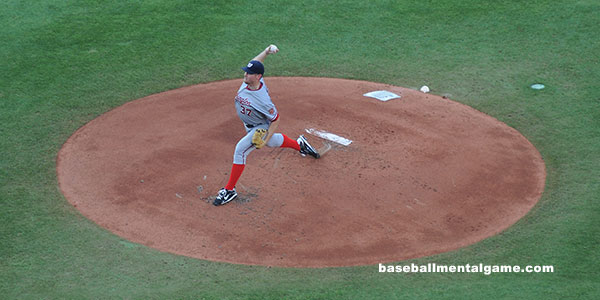
Stop Thinking in Absolute Terms
Baseball is a hard enough game but sometimes baseball players can make the game even more complicated.
One such way baseball players complicate the game is when they think in absolutes. Absolute thinking are generalizations you make about your ability to perform in certain circumstances.
Examples of absolute thinking for baseball players are as follows:
- “I never play well in cold weather.”
- “I always lose when I pitch against that team.”
- “Every time, when the pressure is on, I choke.”
As you see, absolute thinking is filled with terms such as; “always,” “never” or “every.” These terms usually doom baseball players to fail because some players tend to accept absolute thoughts as facts.
For example. The absolute thought, “I never get a hit off this pitcher” is often taken as, “I will never hit this pitcher no matter what the surrounding circumstances are.”
More specifically, this absolute thought can be translated to, “I have never hit this pitcher in the past… I won’t today… and never will in future games.”
The problem with absolute thinking is that this type of thinking affects confidence, focus, confidence, resiliency and performance.
Absolute thinking often turns into a self-fulfilling prophecy… I CAN’T equals I WON’T!
Henry Ford had it right when he said, “Whether you think you can or think you can’t, you’re right.”
Even major league players can get bogged down by absolute statements.
Noah Syndergaard, starting pitcher for the New York Mets, made an interesting comment after an outing where he was pulled out of the game after the sixth inning.
Syndergaard was cruising through four shutout innings. In the fourth inning, Syndergaard faced four batters with successful results that included a ground-out, fly out, walk and strikeout.
Nonetheless, something was bothering Syndergaard after the inning as he proceeded to the dugout and angrily threw his hat on the bench.
Syndergaard didn’t fare so well in the fifth inning, becoming slightly erratic, giving up two runs on three consecutive base hits, including two doubles. That slight shift in thinking gave the Royals a 2-1 lead and, eventually, the victory.
Syndergaard hinted that the humidity was bothering him, as it usually does, which affects his grip on the ball.
SYNDERGAARD: “I had to battle the elements out there. I don’t know what it is about humidity, but we do not get along. Yeah, I was sweating like a greased pig back there. I don’t know what it is, but I’m pretty good at sweating.”
Syndergaard may not be expressing absolute thinking in classical terms but there is a bit of underlying absolute thinking in his statement. The idea of “I never pitch well in humid weather” might have crossed his mind in past performances as well.
The takeaway is that you must recognize this type of thinking, especially if you have the tendency to think in absolute terms, or your generalizations may just lead to a performance rut.
Apply Functional Thinking, Not Absolute Thinking
When you recognize an absolute thought–must, need to, always, every time–re-word it so that it leaves room for improvement and performing functionally.
For example, if you start thinking “I always strike out with the bases loaded” change that thought to “Here’s a new opportunity at the plate.. I am prepared for this challenge.. Focus on making good contact.”
As a ball player, you have to be able to adjust to harsh conditions at time and fight through the game instead of giving in to past generalizations.
Related Sports Psychology Articles
- Justin Verlander: Mentally Tough in The Playoffs
- How to Develop a Ball Player Championship Mindset
- How to Manage High Expectations
*Subscribe to The Sports Psychology Podcast on iTunes
*Subscribe to The Sports Psychology Podcast on Spotify
Get The Mental Edge for Baseball and Softball
If you have trouble taking your practice game to competition and under perform in games, your mental game might be the culprit! Baseball and softball players contact me everyday wanting to know why they become scared, anxious, afraid to make mistakes, and lack trust in their skills during games…
You might have a ton of physical talent and perform great in practice, but if you can’t get the job done when it counts, something is missing and the problem is an inferior mental game–not talent or motivation.
We’ve spent the last six months developing a program to teach you how to improve your mental game in 8 easy-to-apply lessons–the same TOP lessons that I teach to baseball and softball players everyday in my one-on-one mental coaching program!

